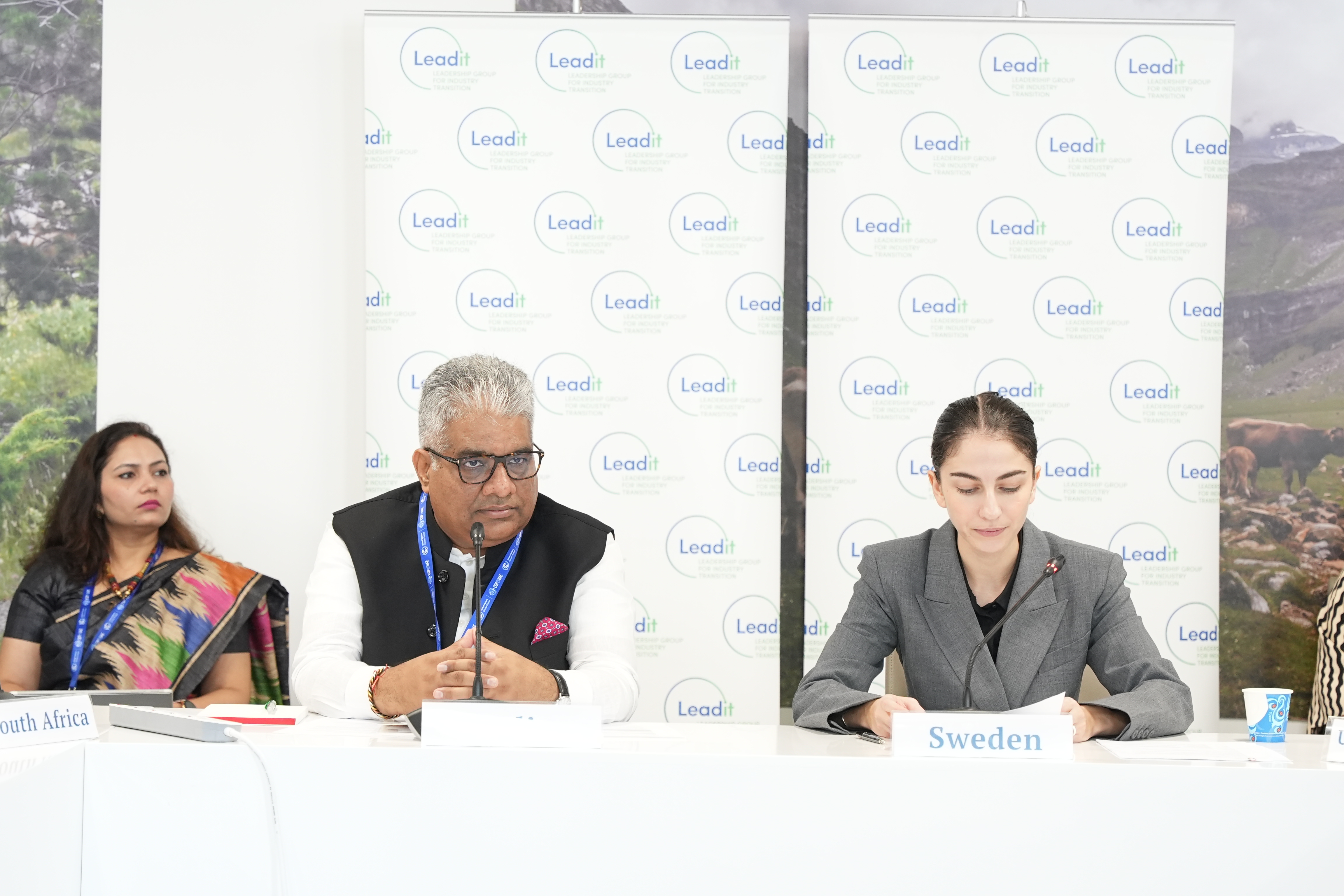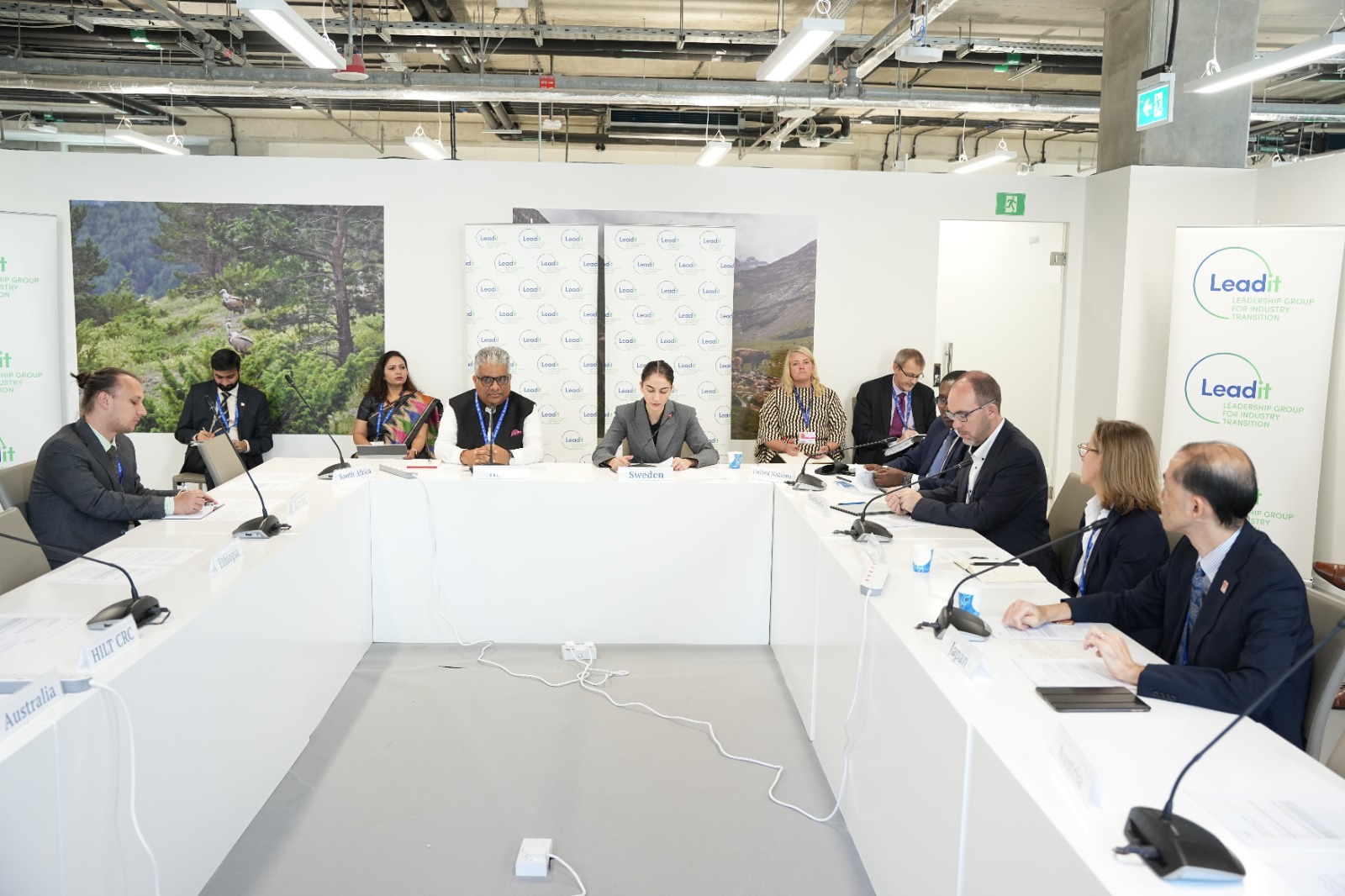Ministry of Environment, Forest and Climate Change
As Phase I draws down, Union Environment Minister Shri Bhupender Yadav announces three pillars of LeadIT 2.0
Urgent mobilization of International climate funds required to enable developing economies transition towards low-carbon future: Shri Bhupender Yadav
India stands firmly dedicated to global cooperation but industry leaders must come forward to drive LeadIT initiative along with Governments
Transparent climate finance, equitable market and facilitative global technology transfer must for deployment of low-carbon climate technologies at scale: Shri Yadav
Summit adopts joint mission statement for the Leadership Group for Industry Transition
Posted On:
09 DEC 2023 4:06PM by PIB Delhi
Union Minister of Environment, Forest and Climate Change Shri Bhupender Yadav has today announced the three pillars of the second phase of Leadership Group for Industry Transition.
Speaking at LeadIT Summit 2023 hosted by India and Sweden at COP28 in UAE and introducing the next phase of LeadIT to the world and industry leaders, Shri Yadav stated that Phase II has been developed on three pillars, which are -
1. A global forum for dialogue;
2. Technology transfer and co-development; and an
3. Industry Transitions Platform.
The Minister credited LeadIT for playing a pioneering role in fostering global partnerships and said that LeadIT has emerged as a beacon of leadership, bringing together industry pioneers, experts, and stakeholders to foster collaboration and drive meaningful change. He further acknowledged that LeadIT has raised the profile of industry transition on the international agenda through annual Summits and efforts of the members at multilateral platforms. He said that the initiative has fostered partnerships to identify and address transition challenges. He noted that one of the focus areas of this was providing support on roadmaps for industry transition of the hard-to-abate sectors. But, at the same time, this has promoted knowledge sharing on ways to accelerate industry transition.
“Through its focused initiatives and unwavering commitment to sustainability, LeadIT has been engaging with industry stakeholders at the international as well as domestic levels”, Shri Yadav said.
Speaking on Industry Transition Platform (ITP), he said that the platform envisages technology co-development, demonstration, and implementation. At the same time, ITPs will effectively coordinate multilateral technical and financial support available through multiple channels.
Shri Yadav informed the audience that one such Industry Transition Platform (ITP) has been developed between India and Sweden, which was launched by leaders of the two countries on 1st December. Developed with an objective to strengthen the institutional framework by developing strong cooperation between India and Sweden it will foster low-carbon transition pathways.

The Minister exuded confidence that the initiative would bring together governments, bilateral and multilateral agencies, the private sector, technology providers, think tanks, and research institutes, for the common goal.
Shri Yadav acknowledged the creation of another such platform between the UK and Brazil. The two pilot ITPs, he said, should pave the way for many more of these collaborations to strengthen the north-south cooperation in climate action.
“The incremental and associated costs of low-carbon technologies require urgent mobilization of International climate funds, enabling developing economies to accelerate their low-carbon transition towards a sustainable future”, he has said.
Restating that India stands firmly in its dedication to global cooperation, he said that it is imperative that we recognise the importance of transparent climate finance mechanisms, equitable market structures, and a facilitative global technology transfer regime in bridging gaps and overcoming the barriers hindering the deployment of low-carbon climate technologies at scale.
At the same time, he reminded the industry leaders that they have a critical role to play in this transformation as they are the innovators and the investors who can shape the trajectory of our industrial systems. He encouraged them to drive this initiative with their continued commitment to the vision and mission of LeadIT, while supporting, promoting and engaging in industry transitions.
Ms. Romina Pourmokhtari, Minister for Climate and Environment of Sweden, speaking on the occasion stressed on the urgency to reduce Greenhouse Gas emissions and said that the world was off track to reach the agreed goals in the Paris agreement.
She underlined that industrialisation is vital for social and economic prosperity of all countries but at the same time decarbonisation and green transition hold opportunities such as regional development, new jobs, investments in new technology, increased efficiency and improved competitiveness.
Speaking on the new phase of the initiative, the Minister from Sweden said that the three pillars of action of LeadIT 2.0 will set course for more action on the ground and it will continue to be a global forum for a just and equitable industry transition. She expressed confidence that LeadIT will support establishment of ambitious country partnerships that spearhead industry transition in emerging markets.
Background
The LeadIT Summit serves as an opportunity for governments and industry to discuss plans and policies for low carbon transition of the industrial sector to align with the goals of the Paris Agreement.
LeadIT 2.0, the second phase of LeadIT was launched by Shri Narendra Modi, Hon’ble Prime Minister of India and Mr. Ulf Kristersson, Prime Minister of Sweden on 1st Dec, 2023.
The summit was co-hosted by Shri Bhupender Yadav, Minister of Environment, Forest and Climate Change, India and Ms. Romina Pourmokhtari, Minister of Environment, Sweden. The LeadIT country and company members participated in the summit to reflect on the milestones achieved since the inception of LeadIT in 2019, and set the direction for the next three years.

The Joint Mission Statement for the LeadIT (2023-26) adopted by the two countries is annexed.
Annexure
Joint mission statement for the Leadership Group for Industry Transition (2024-26)
With a view to launch the next phase of the Leadership Group for Industry Transition (LeadIT), this mission statement is adopted by the membership of LeadIT at the Leadership Summit held during the 28th session of the Conference of Parties to the UNFCCC (COP28) on 9th December 2023 in Dubai, United Arab Emirates.
The low-carbon transition of emission intensive industries, which was considered unfeasible when LeadIT was established in 2019, is now being brought to reality by companies and governments. This has coincided with a significant shift in the global industrial policy landscape as industry transition climbs higher on the international agenda. LeadIT members have launched, supported, and contributed to the multitude of initiatives tackling many of the challenges to industry transition. In doing so, LeadIT’s original mission to build momentum on industry transition has been achieved.
Yet, despite the spotlight on industry transition, the ambition and implementation gaps to achieve the Paris Agreement goals continue to grow especially when considering 2030 as an interim milestone. Progress has been too slow on the enabling conditions for a global transition (e.g. access to clean power, technology and finance; stronger demand signals; credible policy frameworks, etc.). There continues to be a strong need for a just and equitable industry transition in line with the principle of equity and common but differentiated responsibilities and respective capabilities. As a result, LeadIT will be fostering dialogue and strengthened partnerships in areas where transition challenges remain unaddressed and work alongside those countries and companies seeking trusted partners to help design, enhance and implement industry transition.
Strategic direction for next phase of LeadIT
LeadIT’s strategic direction will be driven by the following vision for 2030 and the means of achieving this vision within the next phase of LeadIT.
Vision
By 2030, industry is aligned with the Paris Agreement, accelerating pathways towards a just and equitable industrial transition and net-zero emissions by 2050.
Mission
Drive the development of policy and regulatory frameworks that support an inclusive, just and equitable industry transition by fostering public-private partnerships, mobilising resources and supporting knowledge-sharing, that accelerate pathways to net-zero industry emissions by 2050.
LeadIT pillars
To achieve the stated vision and mission, the work of LeadIT until the end of 2026 will advance under three pillars of activities.
- Global forum for a just and equitable industry transition
LeadIT will continue to secure a space for dialogue between governments and industry at the annual Leadership Summit and find additional opportunities at high-level events. In addition, this pillar focuses on continuing LeadIT’s engagement and alignment with multilateral groups (e.g. UN Climate Action; UNFCCC COP presidencies; etc.); equipping members by sharing knowledge; and monitoring the pace of the transition.
- Technology transfer and co-development
Promote facilitation of business-to-business technology transfer, demonstration and co- development among LeadIT members (e.g. shared patents, R&D incubators, technical guidelines, etc.), as well as building up national institutional capacity for innovation. Where appropriate, activities under this pillar will be supported by research institutes and build on existing innovation partnerships.
- Industry transition partnerships for coordinated multilateral assistance
The LeadIT Secretariat will support LeadIT members wishing to establish industry transition partnerships. These partnerships will provide bespoke and targeted support for emerging markets and developing economies pursuing green industrial transitions by mapping, coordinating, aggregating, and strengthening the technical and financial international assistance on offer. Ultimately, the partnerships seek to improve the effectiveness of international assistance to deliver the enabling conditions that can build a pipeline of bankable low-carbon industrial projects.
Member commitments
To fulfil the vision and mission of the next phase of LeadIT, all members commit to:
- Support industry transitions
- Demonstrate commitment to bold and ambitious emissions reductions in line with the Paris Agreement.
- Subscribe to the LeadIT mission and vision.
- Engage on industry transitions
- Engage in one or more of LeadIT’s three pillars and associated activities
- Contribute to the annual Leadership Summit at Ministerial or CEO level, and regular LeadIT activities (e.g. meetings, workshops, seminars, etc.)
- Actively engage with the LeadIT Secretariat and LeadIT members to share information about members’ activities on industry transition
- Promote industry transitions
- Demonstrate commitment to engaging with governments and firms across value chains to support policy, innovation and technology measures that will deliver emissions reductions.
- Provide updates on progress at key milestones (e.g. COPs, UN summits, etc.).
***
MJPS/SS
(Release ID: 1984440)
Visitor Counter : 2800